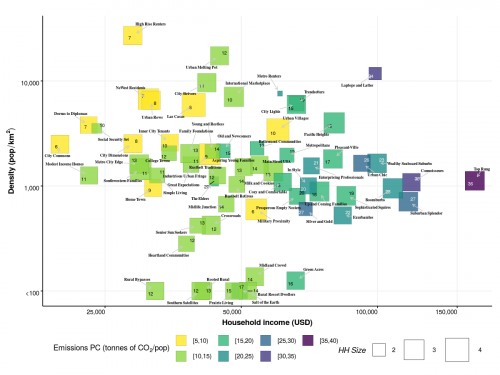In a new article published to Environmental Research Letters, Department of Geographical Sciences researchers Giovanni Baiocchi and Kuishuang Feng find that location-based data that groups individuals based on where they live and their demographic profile can be used to understand and reduce the carbon footprints of specific lifestyles.
The study combined a geodemographic market segmentation system with an environmentally extended input-output framework to understand the direct and indirect carbon dioxide emissions associated with lifestyles and consumption patterns in the United States at a fine spatial scale. It is the first use of high-resolution consumer segmentation geodemographic data to look at the US carbon footprint of lifestyles, and the first analysis that links the differences between suburban and urban footprints directly to lifestyle patterns resulting from households’ consumption. The study finds that emissions between high-density, urban, poor households and low-density, suburban, rich households vary by a factor of 6 and that lifestyles are as important as income in explaining emissions.
In the study, lifestyles are distinguished by Esri’s Tapestry Segmentation System and are organized in a cross-sectional data set in which every census tract in the country is classified into one of sixty-five segments according to the dominant socioeconomic variables of local consumers (e.g., income, household size, housing location, population density, housing type, commuting information, education level and race). Lifestyle classification names, such as 'Metropolitans' or 'Inner City Tenants', are reflections of these composite variables and convey consumer commonalities across space. Each lifestyle in each locale provides detailed information about potential emission drivers and context useful for better understanding potential policies.
These analyses can be used to understand the impacts of our behavior and showcase the potential uses of geodemographic segmentations for reducing the impact of specific lifestyles. Baiocchi, lead author of the paper, explains:
Read the paper here.




